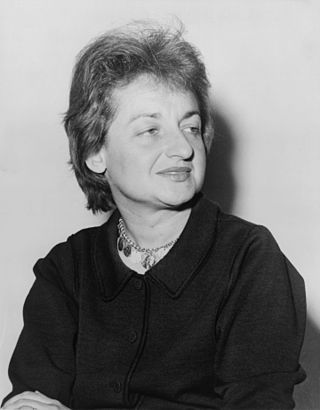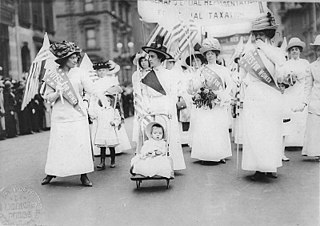
Betty Friedan was an American feminist writer and activist. A leading figure in the women's movement in the United States, her 1963 book The Feminine Mystique is often credited with sparking the second wave of American feminism in the 20th century. In 1966, Friedan co-founded and was elected the first president of the National Organization for Women (NOW), which aimed to bring women "into the mainstream of American society now [in] fully equal partnership with men".
Liberal feminism, also called mainstream feminism, is a main branch of feminism defined by its focus on achieving gender equality through political and legal reform within the framework of liberal democracy. It is often considered culturally progressive and economically center-right to center-left. As the oldest of the "Big Three" schools of feminist thought, liberal feminism has its roots in 19th century first-wave feminism that focused particularly on women's suffrage and access to education, and that was associated with 19th century liberalism and progressivism. Liberal feminism "works within the structure of mainstream society to integrate women into that structure." Liberal feminism places great emphasis on the public world, especially laws, political institutions, education and working life, and considers the denial of equal legal and political rights as the main obstacle to equality. As such liberal feminists have worked to bring women into the political mainstream. Liberal feminism is inclusive and socially progressive, while broadly supporting existing institutions of power in liberal democratic societies, and is associated with centrism and reformism. Liberal feminism tends to be adopted by white middle-class women who do not disagree with the current social structure; Zhang and Rios found that liberal feminism with its focus on equality is viewed as the dominant and "default" form of feminism. Liberal feminism actively supports men's involvement in feminism and both women and men have always been active participants in the movement; progressive men had an important role alongside women in the struggle for equal political rights since the movement was launched in the 19th century.
Second-wave feminism was a period of feminist activity that began in the early 1960s and lasted roughly two decades. It took place throughout the Western world, and aimed to increase equality for women by building on previous feminist gains.
NARAL Pro-Choice America, commonly known as simply NARAL, is a non-profit 501(c)(4) organization in the United States that engages in lobbying, political action, and advocacy efforts to oppose restrictions on abortion, to expand access to abortion and birth control, and to support paid parental leave and protection against pregnancy discrimination.
The Lavender Menace or revolution was an informal group of lesbian radical feminists formed to protest the exclusion of lesbians and their issues from the feminist movement at the Second Congress to Unite Women in New York City on May 1, 1970. Members included Karla Jay, Martha Shelley, Rita Mae Brown, Lois Hart, Barbara Love, Ellen Shumsky, Artemis March, Cynthia Funk, Linda Rhodes, Arlene Kushner, Ellen Broidy, and Michela Griffo, and were mostly members of the Gay Liberation Front (GLF) and the National Organization for Women (NOW).
Grace Atkinson, better known as Ti-Grace Atkinson, is an American radical feminist activist, writer and philosopher.
New York Radical Feminists (NYRF) was a radical feminist group founded by Shulamith Firestone and Anne Koedt in 1969, after they had left Redstockings and The Feminists, respectively. Firestone's and Koedt's desire to start this new group was aided by Vivian Gornick's 1969 Village Voice article, "The Next Great Moment in History Is Theirs". The end of this essay announced the formation of the group and included a contact address and phone number, raising considerable national interest from prospective members. NYRF was organized into small cells or "brigades" named after notable feminists of the past; Koedt and Firestone led the Stanton-Anthony Brigade.

The National Organization for Women (NOW) is an American feminist organization. Founded in 1966, it is legally a 501(c)(4) social welfare organization. The organization consists of 550 chapters in all 50 U.S. states and in Washington, D.C. It is the largest feminist organization in the United States with around 500,000 members. NOW is regarded as one of the main liberal feminist organizations in the US, and primarily lobbies for gender equality within the existing political system. NOW campaigns for constitutional equality, economic justice, reproductive rights, LGBTQIA+ rights and racial justice, and against violence against women.
Florence Rush was an American certified social worker, feminist theorist and organizer best known for introducing The Freudian Coverup in her presentation "The Sexual Abuse of Children: A Feminist Point of View", about childhood sexual abuse and incest, at the April 1971 New York Radical Feminists (NYRF) Rape Conference. Rush's paper at the time was the first challenge to Freudian theories of children as the seducers of adults rather than the victims of adults' sexual/power exploitation.

The Women's Strike for Equality was a strike which took place in the United States on August 26, 1970. It celebrated the 50th anniversary of the passing of the Nineteenth Amendment, which effectively gave American women the right to vote. The rally was sponsored by the National Organization for Women (NOW). Estimates ranged as high as 50,000 women at the protest in New York City and more protested throughout the country. At this time, the gathering was the largest on behalf of women in the United States. The strike, spearheaded by Betty Friedan, self-stated three primary goals: free abortion on demand, equal opportunity in the workforce, and free childcare. The strike also advocated for other second wave feminist goals more generally, such as political rights for women, and social equality in relationships such as marriage.

The National Women's Conference of 1977 was a four-day event during November 18–21, 1977, as organized by the National Commission on the Observance of International Women's Year. The conference drew around, 2,000 delegates along with 15,000-20,000 observers in Houston, Texas. The United States Congress approved $5 million in public appropriations for both the state and national conferences as HR 9924, sponsored by Congresswoman Patsy Mink, which Ford signed into law. In 1977 at the start of his presidency, President Jimmy Carter chose a new Commission and appointed Congresswoman Bella Abzug to head it. Numerous events were held over the next two years, culminating in the National Women's Conference.
Jacqueline "Jacqui" Michot Ceballos is an American feminist and activist. Ceballos is the former president of New York Chapter of the National Organization for Women and founder of the Veteran Feminists of America organization which documents the history of Second wave feminism and pioneer feminists. Ceballos' 1971 debate on sexual politics with Norman Mailer and Germaine Greer is recorded in the 1979 film Town Bloody Hall. Ceballos is also featured in the feminist history film She's Beautiful When She's Angry.

Feminism in the United States refers to the collection of movements and ideologies aimed at defining, establishing, and defending a state of equal political, economic, cultural, and social rights for women in the United States. Feminism has had a massive influence on American politics. Feminism in the United States is often divided chronologically into first-wave, second-wave, third-wave, and fourth-wave feminism.
Feminist views on sexuality widely vary. Many feminists, particularly radical feminists, are highly critical of what they see as sexual objectification and sexual exploitation in the media and society. Radical feminists are often opposed to the sex industry, including opposition to prostitution and pornography. Other feminists define themselves as sex-positive feminists and believe that a wide variety of expressions of female sexuality can be empowering to women when they are freely chosen. Some feminists support efforts to reform the sex industry to become less sexist, such as the feminist pornography movement.
The personal is political, also termed The private is political, is a political argument used as a rallying slogan of student movement and second-wave feminism from the late 1960s. In the context of the feminist movement of the 1960s and 1970s, it was a challenge to the nuclear family and family values. The phrase was popularized by the publication of a 1969 essay by feminist Carol Hanisch under the title "The Personal is Political" in 1970, and has been repeatedly described as a defining characterization of second-wave feminism, radical feminism, women's studies, or feminism in general. It has also been used by some women artists as the underlying philosophy for their art practice.
Barbara Joan Love was an American feminist writer and the editor of Feminists who Changed America, 1963–1975. With the National Organization for Women, Love organized and participated in demonstrations, and she also worked within the organization to improve its acceptance of lesbian feminists. She helped to found consciousness-raising groups for lesbian feminists and was active in the gay liberation movement.
World Conference on Women, 1975 was held between 19 June and 2 July 1975 in Mexico City, Mexico. It was the first international conference held by the United Nations to focus solely on women's issues and marked a turning point in policy directives. After this meeting, women were viewed as part of the process to develop and implement policy, rather than recipients of assistance. The conference was one of the events established for International Women's Year and led to the creation of both the United Nations Decade for Women and follow-up conferences to evaluate the progress that had been made in eliminating discrimination against women and their equality. Two documents were adopted from the conference proceedings, the World Plan of Action which had specific targets for nations to implement for women's improvement and the Declaration of Mexico on the Equality of Women and Their Contribution to Development and Peace, which discussed how nations foreign policy actions impacted women. It also led to the establishment of the International Research and Training Institute for the Advancement of Women to track improvements and continuing issues and the United Nations Development Fund for Women to provide funding for developmental programs. The conference marked the first time that the parallel Tribune meeting was successful in submitting input to the official meeting and became a catalyst for women's groups to form throughout the world.
Pamela (Pam) Elam is a retired attorney and feminist activist who has worked for both women's and LGBT rights throughout her career. Elam was born in Kentucky, where she gained her undergraduate degree and JurisDoctorate before moving to New York to pursue her master's degree. Since, she has influenced New York governance through professional offices and activist organizations, and represented the LGBT community as an open lesbian since the late 1970s. Since retiring from government work, she has continued her activism through projects promoting women's visibility in New York City.
This is a Timeline of second-wave feminism, from its beginning in the mid-twentieth century, to the start of Third-wave feminism in the early 1990s.
Ellen Broidy is an American gay rights activist. She was one of the proposers and a co-organizer the first gay pride march.




